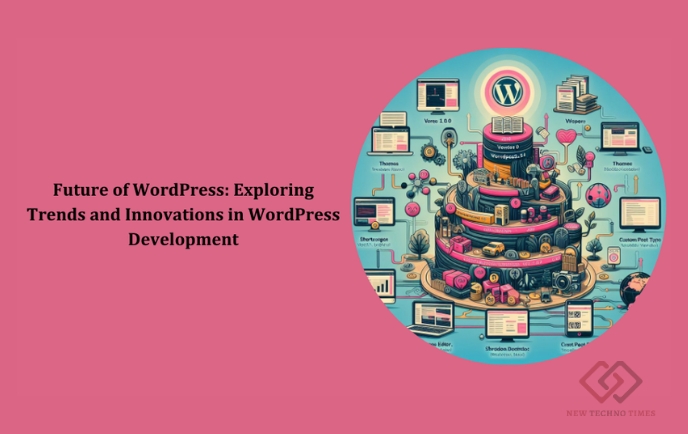Exploring Trends and Innovations in WordPress
WordPress, the ubiquitous content management system (CMS), has revolutionized web creation, empowering millions to build and manage their online presence.
But with technology constantly evolving, what does the future hold for this dominant platform? Here, we delve into some of the captivating trends and innovations shaping the future of WordPress.
The Headless Revolution: Decoupling for Unmatched Flexibility
Traditional WordPress operates on a monolithic architecture, where the front-end presentation (what users see) and the back-end functionality (content management) are intertwined.
This approach can limit flexibility, especially for complex websites. Enter headless WordPress. This architecture separates the front-end from the back-end, empowering WordPress developers to build custom user interfaces using frameworks like React or Vue.js
The content is then delivered via a RESTful API, providing unmatched flexibility and scalability. Headless WordPress empowers the creation of lightning-fast, highly customized websites and progressive web apps (PWAs) that offer an app-like experience.
Also Read: Crafting Your Online Presence With Joomla Web Development
E-commerce on Autopilot: A Smoother Shopping Journey
WordPress has become a powerhouse for e-commerce, with plugins like WooCommerce leading the charge. The future promises even more streamlined experiences for both store owners and customers.
Expect advancements in features like one-click checkouts, advanced product filtering and search functionalities, and real-time inventory management. Integration with artificial intelligence (AI) will personalize product recommendations and streamline the shopping journey.
Additionally, the rise of on-demand headless WordPress e-commerce marketplaces is on the horizon, allowing for the creation of dynamic and feature-rich online stores.
The Power of AI: Building Smarter Websites
AI is transforming various industries, and web development is no exception. WordPress is poised to embrace AI in several ways. AI-powered chatbots can provide 24/7 customer support, answer frequently asked questions, and personalize the user experience.
Content creation tools powered by AI can assist with content generation, grammar checking, and even content optimization for search engines. Imagine a website that learns from user behavior and dynamically adjusts its content and layout to deliver a more relevant and engaging experience.
Block-Based Development: Democratizing Website Creation
The introduction of the WordPress Block Editor has ushered in a new era of block-based development. This intuitive interface allows users to build and customize their websites using pre-designed blocks, similar to building with Lego.
Blocks can encompass text, images, videos, forms, and more. This drag-and-drop approach empowers even non-technical users to create professional-looking websites without needing to write code.
Furthermore, the block editor opens doors for developers to create custom blocks, extending the functionality of WordPress and making website creation even more versatile.
Also Read: WordPress vs Drupal – A Comprehensive Comparison for your website
Voice Search Optimization: Catering to the Spoken Word
With the rise of voice-activated devices like Google Home and Amazon Alexa, voice search is becoming increasingly popular. Optimizing your WordPress website for voice search will be crucial in the future.
This involves using natural language in your content, focusing on long-tail keywords, and ensuring your website loads quickly on mobile devices, as most voice searches are conducted on smartphones.
By optimizing for voice search, you can ensure your website remains discoverable even as search behavior continues to evolve.
Security Takes Center Stage: A Secure Future for WordPress
WordPress’s popularity also makes it a target for hackers. The future will see a continued focus on security enhancements, with core updates likely to prioritize security patches and vulnerability fixes.
Developers will create more robust security plugins that offer features like two-factor authentication, advanced malware scanning, and website firewalls.
Users will need to prioritize strong passwords, regularly update their themes and plugins, and back up their websites regularly to maintain a secure online presence.
A Focus on Performance: Speeding Up the Web Experience
In today’s fast-paced world, website speed is paramount. The future of WordPress will see advancements in caching mechanisms, image optimization tools, and code minification techniques to ensure websites load lightning fast.
Additionally, with the increasing adoption of headless WordPress, developers can leverage the power of Content Delivery Networks (CDNs) to deliver content from geographically distributed servers, further reducing load times and improving user experience globally.
Also Read: 6 Best Programming Languages For Web Development
Conclusion:
WordPress is far from stagnant. By embracing innovation and adapting to new trends, WordPress is poised to remain a dominant force in web creation.
From headless architecture and AI integration to block-based development and a focus on security and performance, the future of WordPress is brimming with possibilities.
So, whether you’re a seasoned developer or a budding website owner, WordPress offers a powerful and ever-evolving platform to build your digital presence.
Zalak Shah is the Vice President of Covrize. With 19 years of experience working in different IT industry domains, he has extensive knowledge to bridge the gap between businesses in both the tech and non-tech sectors.

